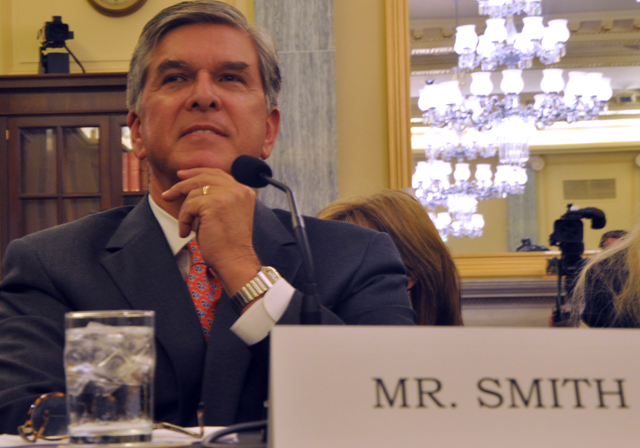
National Association of Broadcasters CEO Gordon Smith said there is no need to make changes to the Cable Act. (Matt Michaels/Medill News Service)
WASHINGTON – An influential Senate committee called leading players in the broadcast industry to a hearing on Capitol Hill Tuesday in a quest for answers about the escalating fees and blackouts plaguing TV viewers across the country.
Sen. Jay Rockefeller, D-WV, chairman of the Senate Committee on Commerce, Science and Transportation, said the 20-year-old Cable Television and Consumer Protection Act no longer encourages competition or protects consumers – the law’s original goals.
“Consumers are still forced to purchase larger and larger packages of channels no matter how few they actually watch,” Rockefeller said. “This says to me that the market isn’t working. Real competition should be bringing rates down.”
Sen. John Kerry, D-MA, said one of the biggest problems with the Cable Act is the service disruptions that result from standoffs between cable providers and TV stations over retransmission fees.
“I don’t want to see the pulling of signals become a repeatedly used tool for arriving at a dispute resolution,” Kerry said. “I want to shield consumers from unfair treatment or from being pawns in negotiations.”
While Kerry said he does not want to overhaul the existing law, he is in favor of making “moderate tweaks” to retransmission procedures.
Republican Sen. Jim DeMint, R-SC, said tweaks would not be enough. Instead, he said Congress should repeal the 1992 law because competition has resulted in increased options for viewers. “It was a right created out of whole cloth to combat a cable monopoly,” DeMint said.
Colleen Abdoulah, chairwoman of the American Cable Association and CEO of WOW!, also said minor changes would not be enough.
“The 1992 Act lags behind profound technological developments and business innovation,” Abdoulah said. “As a result, outdated laws applied to a rapidly changing marketplace create serious problems for consumers.”
As evidence, Abdoulah said that there have already been 69 blackouts this year – a 35 percent jump from last year.
But not everyone was on board with altering the law. Martin Franks, the executive vice president for planning, policy and government affairs for CBS Corp., said making changes to the retransmission process would have a severe impact on the television industry – particularly the local markets.
“Introducing even more claimants into an already challenging negotiating environment may lead to more disputes, not fewer,” Franks said. “Many smaller players, including small cable operators, will be squeezed out of the business.”
Franks also said CBS’ track record proves the blackout problem has been blown out of proportion. Since CBS split with Viacom more than six years ago, Franks said the company has successfully negotiated close to 100 retransmission agreements without any hiccups in service.
Gordon Smith, CEO of the National Association of Broadcasters, echoed Franks’ sentiments and said that more than 99 percent of the deals between cable providers and TV stations are completed without ever hurting the consumer.
Of the 5,800 cable and satellite television providers in the U.S., Smith said that only three companies – Time Warner Cable, DirecTV and Dish Network Corp. – are responsible for 75 percent of disruptions this year.
“Even after two decades, the retransmission consent system is working just as this committee wisely intended,” Smith said. “Congress in its wisdom has fostered what is unique across the globe – a local broadcasting system that provides local content and community focused programming.”
